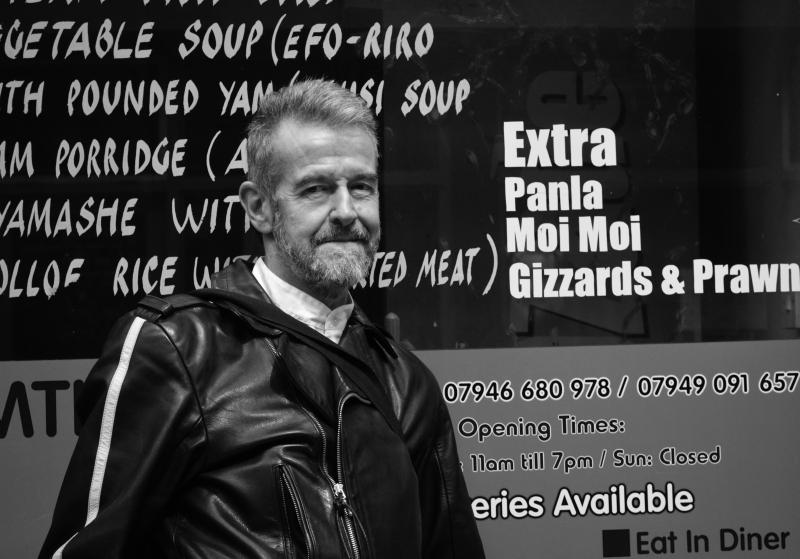Adam Mars-Jones: Batlava Lake review - pride and prejudice in the Kosovo War | reviews, news & interviews
Adam Mars-Jones: Batlava Lake review - pride and prejudice in the Kosovo War
Adam Mars-Jones: Batlava Lake review - pride and prejudice in the Kosovo War
Conflict through the eyes of an irritable British Army engineer

For a slim book of some 100 pages, Batlava Lake by Adam Mars-Jones is deceptively meandering. The novella is narrated by Barry Ashton, an engineer attached to the British Army troops stationed with the peacekeeping forces during the Kosovo War. Barry admits to us that he is not good on the phone, or on paper, and he struggles putting things into words face to face.
Barry is the sort of man who, on his wedding day, refused to wear the tie that his ex-wife chose and knotted for him because it was a “Point of Honour” against being treated like “a kid”. He describes his sex life with this brilliant, albeit hilariously nauseating, metaphor: “Korma is always tasty, nothing wrong with a nice creamy korma, but sometimes – you just feel like vindaloo”, and he thinks Elton John is not exactly normal because he spends far too much on flowers (and, of course, because he is gay). Barry also lets us know that he does not like Italian food because it is “too tasty”. From his proud avowal of his absentee father status to his commitment to beans on toast for tea, Barry is very much a definitive character study of a distinctly British, middle-class masculinity.
 Mars-Jones bares his protagonist’s prejudices and insecurities to the reader: Barry refers to the Kosovo Albanians as “chogies" and quite evidently carries a chip on his shoulder about being a civilian attached to the army. His experiences of being posted in a conflict zone reflect mostly on his alienation from his surroundings or the inane details of army life – his single-minded focus on describing them to us is evidently a deflection from the brutal truth of war. The climax of the novel, which until this point avoids describing violence or bloodshed, is a moment where this grim reality stands out. This tonal shift in the climax does not feel sudden; what makes it particularly impressive is that it brings to the fore the novel’s underlying sense of unease and foreboding, which Mars-Jones builds artfully throughout its brief length.
Mars-Jones bares his protagonist’s prejudices and insecurities to the reader: Barry refers to the Kosovo Albanians as “chogies" and quite evidently carries a chip on his shoulder about being a civilian attached to the army. His experiences of being posted in a conflict zone reflect mostly on his alienation from his surroundings or the inane details of army life – his single-minded focus on describing them to us is evidently a deflection from the brutal truth of war. The climax of the novel, which until this point avoids describing violence or bloodshed, is a moment where this grim reality stands out. This tonal shift in the climax does not feel sudden; what makes it particularly impressive is that it brings to the fore the novel’s underlying sense of unease and foreboding, which Mars-Jones builds artfully throughout its brief length.
Mars-Jones’s considerable strength as a storyteller lies in his ability to inhabit the inner lives of his characters so intimately. His previous release, Box Hill (2020), another slim novella, won rave reviews for its nuanced portrayal of BDSM subculture in the 1970s. Mars-Jones’s other two mammoth novels, Pilcrow (2008) and Cedilla (2011), follow the life of a disabled gay man named John Cromer with imagination and sensitivity. The reader might almost mistake his novels for memoirs – in Batlava Lake, the fictional nature of his writing is underlined by subtle turns and curious narrative omissions, casting a shadow on Barry’s reliability as a narrator. Yet, I could not help but feel some disappointment: why must a novel about the Kosovo War centre so overwhelmingly on a white male narrator and his gaze? The real victims of the conflict, i.e. Albanian Muslims, are not given any of the dignity of empathetic humanisation that the author takes pains to sketch for Barry. Kosovo Albanians are trauma lodged somewhere in the background – nameless, faceless “zombies”. And Barry himself, whose perspective is so predominant, never develops into an interesting or moving enough human portrait to justify the space he takes up.
Mars-Jones manages to do an exceptional job of conveying the horrors of war for such a short novel, using its brevity to the story’s advantage while drawing an inconspicuous but hard-hitting portrait of political collapse. In a brief but moving section, in the middle of a fight with his wife, Barry fruitlessly tries to convey to her that “The people here have nothing. Nothing. And they’re the lucky ones – the ones who have nothing … We have everything, everything we need and a bit left over. Can’t we stop fighting about things that don’t matter?”. But despite this and his firm command of the novella’s darkly humorous tone, Batlava Lake never reaches the heights of Box Hill, whose narrator was similarly flawed but which included a more complex web of characters and emotions.
“Regular bloke” narrator Barry never won my sympathy. I started off by being irritated by him and eventually just found him boring. To become truly satisfying, a flawed, unreliable narrator needs, I think, to be complemented by other memorable characters (think Mrs Danvers in Daphne du Maurier’s Rebecca or Miss Kenton in The Remains of The Day by Kazuo Ishiguro) if they’re to tell a rich, textured story. Since Batlava Lake is structured more as a character study than a plot-driven war novel, its bone-chilling climax cannot, unfortunately, make up for its rather dull and odious protagonist.
- Batlava Lake by Adam Mars-Jones (Fitzcarraldo Editions, £10.99)
- Read more book reviews on theartsdesk
The future of Arts Journalism
You can stop theartsdesk.com closing!
We urgently need financing to survive. Our fundraising drive has thus far raised £49,000 but we need to reach £100,000 or we will be forced to close. Please contribute here: https://gofund.me/c3f6033d
And if you can forward this information to anyone who might assist, we’d be grateful.

Subscribe to theartsdesk.com
Thank you for continuing to read our work on theartsdesk.com. For unlimited access to every article in its entirety, including our archive of more than 15,000 pieces, we're asking for £5 per month or £40 per year. We feel it's a very good deal, and hope you do too.
To take a subscription now simply click here.
And if you're looking for that extra gift for a friend or family member, why not treat them to a theartsdesk.com gift subscription?
more Books
 'We are bowled over!' Thank you for your messages of love and support
Much-appreciated words of commendation from readers and the cultural community
'We are bowled over!' Thank you for your messages of love and support
Much-appreciated words of commendation from readers and the cultural community
 Thomas Pynchon - Shadow Ticket review - pulp diction
Thomas Pynchon's latest (and possibly last) book is fun - for a while
Thomas Pynchon - Shadow Ticket review - pulp diction
Thomas Pynchon's latest (and possibly last) book is fun - for a while
 Justin Lewis: Into the Groove review - fun and fact-filled trip through Eighties pop
Month by month journey through a decade gives insights into ordinary people’s lives
Justin Lewis: Into the Groove review - fun and fact-filled trip through Eighties pop
Month by month journey through a decade gives insights into ordinary people’s lives
 Joanna Pocock: Greyhound review - on the road again
A writer retraces her steps to furrow a deeper path through modern America
Joanna Pocock: Greyhound review - on the road again
A writer retraces her steps to furrow a deeper path through modern America
 Mark Hussey: Mrs Dalloway - Biography of a Novel review - echoes across crises
On the centenary of the work's publication an insightful book shows its prescience
Mark Hussey: Mrs Dalloway - Biography of a Novel review - echoes across crises
On the centenary of the work's publication an insightful book shows its prescience
 Frances Wilson: Electric Spark - The Enigma of Muriel Spark review - the matter of fact
Frances Wilson employs her full artistic power to keep pace with Spark’s fantastic and fugitive life
Frances Wilson: Electric Spark - The Enigma of Muriel Spark review - the matter of fact
Frances Wilson employs her full artistic power to keep pace with Spark’s fantastic and fugitive life
 Elizabeth Alker: Everything We Do is Music review - Prokofiev goes pop
A compelling journey into a surprising musical kinship
Elizabeth Alker: Everything We Do is Music review - Prokofiev goes pop
A compelling journey into a surprising musical kinship
 Natalia Ginzburg: The City and the House review - a dying art
Dick Davis renders this analogue love-letter in polyphonic English
Natalia Ginzburg: The City and the House review - a dying art
Dick Davis renders this analogue love-letter in polyphonic English
 Tom Raworth: Cancer review - truthfulness
A 'lost' book reconfirms Raworth’s legacy as one of the great lyric poets
Tom Raworth: Cancer review - truthfulness
A 'lost' book reconfirms Raworth’s legacy as one of the great lyric poets
 Ian Leslie: John and Paul - A Love Story in Songs review - help!
Ian Leslie loses himself in amateur psychology, and fatally misreads The Beatles
Ian Leslie: John and Paul - A Love Story in Songs review - help!
Ian Leslie loses himself in amateur psychology, and fatally misreads The Beatles
 Samuel Arbesman: The Magic of Code review - the spark ages
A wide-eyed take on our digital world can’t quite dispel the dangers
Samuel Arbesman: The Magic of Code review - the spark ages
A wide-eyed take on our digital world can’t quite dispel the dangers
 Zsuzsanna Gahse: Mountainish review - seeking refuge
Notes on danger and dialogue in the shadow of the Swiss Alps
Zsuzsanna Gahse: Mountainish review - seeking refuge
Notes on danger and dialogue in the shadow of the Swiss Alps

Add comment